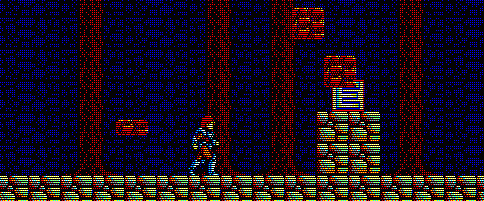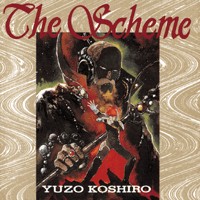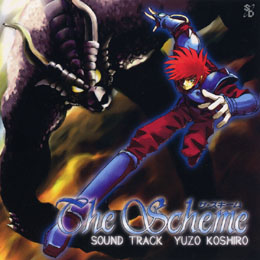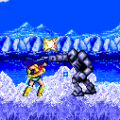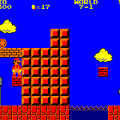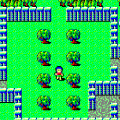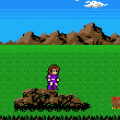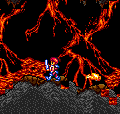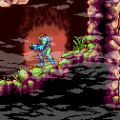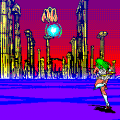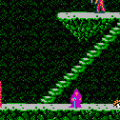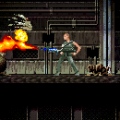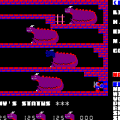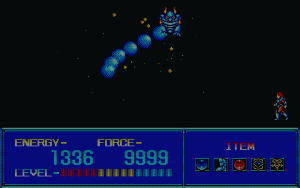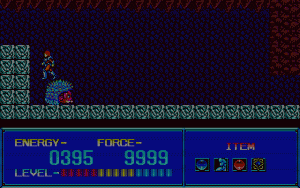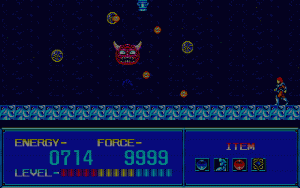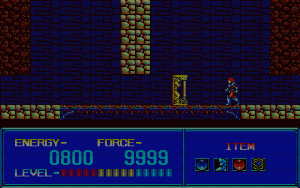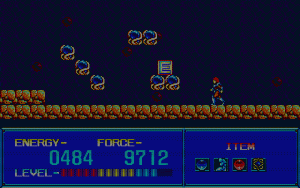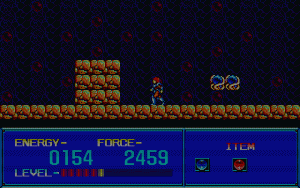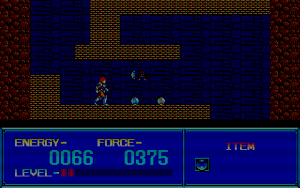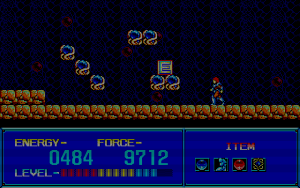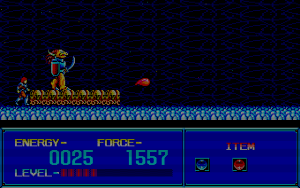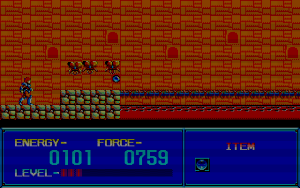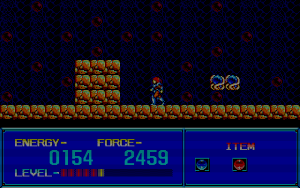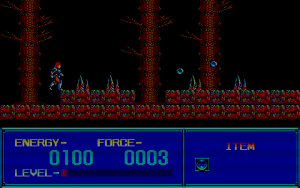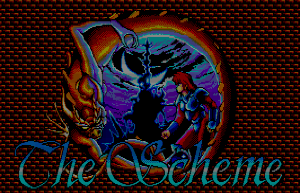Hardcore video game music fans might recognize The Scheme as being one of the early works of famed composer Yuzo Koshiro. Koshiro started his musical career at Falcom, working on Xanadu, Ys and Legacy of the Wizard before going freelance. Though most North Americans know his name through his work on Revenge of Shinobi, Actraiser and Streets of Rage, he contributed to several obscure games, like Misty Blue and No Life King. This connection, along with his Falcom work, is largely the reason why he was hired by Atlus for their Etrian Odyssey / Sekaiju no Meikyuu series for the DS, which hails nostalgically back to the days of 80s computer gaming.
Released in 1988 for the PC-88 by Bothtec (which would later become the studio known as Quest, who eventually went on to create Ogre Battle), The Scheme is a side-scrolling action-RPG vaguely similar to Castlevania II: Simon’s Quest and Metroid. Although the game is divided up into chapters, the structure isn’t totally linear – the goal in each given stage is to explore until you find the boss and kill it, which will give you an item to open up the next stage. The first level is pretty simple – you start off square in the center of the stage, with the boss straight to the left, and the exit straight to the right. It gets considerably more complicated from there, consisting of huge maze-like dungeons, and even the progression isn’t completely linear, as you can often times find yourself stumbling into areas where you’re severely underpowered. The game apparently has more than 500 screens, so there’s a whole lot of ground to cover.
Playing as a hero named Mars Rhea, who looks suspiciously like Adol from Falcom’s Ys games, you’re armed with what appear to be magic bullets. Enemies explode in little bubbles, which will increase both your life meter and your “Force”, which is basically just your experience gauge. When you get enough Force, your weapon will become stronger, although the only way to increase your maximum health is by finding “E” icons strewn throughout the stages. (Apparently the developers did little to hide its inspiration from Metroid.) You can also find items to instantly gain a level, or to upgrade your weapon. The magic attack essentially stays the same throughout the entire game, but it gets considerably stronger as you go along.
All things considered, The Scheme isn’t exactly a classic – even though it controls well, if you were to remove the exploration elements, it’d be a pretty middle-of-the-line action game. The screens are presented one-by-one – i.e. no scrolling – and most of them look too similar to each other. For as confusing as Metroid or Goonies II were, at least they offered some sense of logic in how everything was laid out. The Scheme doesn’t, which makes the constant backtracking even more annoying than games like this. It also feels a bit bloated – it’s nice that it’s huge, but there’s not much going on there. Having the enemies explode in orbs looks pretty cool, but it’s all too easy for them to bounce off the screen, especially in the vertically oriented stages. Plus, there are too many instances where you enter a screen and get immediately knocked back. Of course, there’s no map, and getting killed means you’re sent to the entrance of the area. Usually this won’t happen too often, since you can usually take tons of hits, and life restoration orbs are numerous, but it’s a pain when fighting bosses.
Still, non-linear action-adventure games like this are pretty rare, and while it’s not exactly the best, even compared to its NES brethren, it’s probably worth a shot for this type of game. It is pretty obscure, mostly because it never received any type of port – most of these types of games usually ended up on the Famicom at some point, but this one never left the PC-88.
Outside of the game, the most notable element is the music, of course. There are actually two completely different soundtracks – “Normal” and “Special”, with the latter using the Sound Board II expansion, the first game to do so. Both are excellent, but the “Special” soundtrack is higher quality. Anyone with an affinity for FM synth and old-school style action music – particularly Falcom fans – will undoubtedly love it. One can only imagine what a PC Engine-style makeover would do for this, although you can still find the occasional Japanese remixer releasing songs based on it.
Links:
Gyusabu – The Scheme A review with screenshots
VGMDB Listing for the soundtrack rerelease.
Project EGG – Soundtrack Includes soundtrack samples
Project EGG – English site Download The Scheme, but only if you join.
Wanderers from Super Scheme (ワンダラーズ・フロム・スーパースキーム) – PC-88 (1989)
